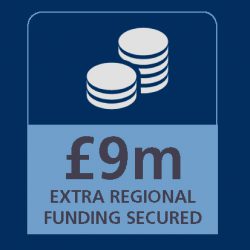The Oxford AHSN has been involved in a number of successful SBRI bids, and has leveraged £8.98m of funding into the region.
- Brainomix Phase 1 – 2013, Phase 2 – 2013.
Brainomix aim to develop software for a stroke assessment system that can be used to identify patients more likely to benefit from life-saving treatment.
 Capillary Film Technology Phase 1 – 2014, Phase 2 – 2015
Capillary Film Technology Phase 1 – 2014, Phase 2 – 2015
CFT have developed a highly cost-effective microfluidic assay platform utilising a novel material – micro capillary film – to meet the growing need for quantitative measurement of multiple biomarkers at the point of care. Phase 1 developed pre-product prototypes and enough feasibility data to justify investment into point of care cardiovascular product development. Phase 2 funding has developed the technology further to allow mass production of simple devices that can test three or more biomarkers in a single clinical sample.
- EcoRoute Phase 1 – 2009
Eco-Route has developed a programme to encourage children to cycle or walk to school and to increase their levels of physical activity generally through an approach that involves the whole school.
- Fuel 3D Project completed Spring 2015
Fuel 3D have developed a system that delivers accurate and repeatable 3D imaging technology to wound care. An innovative hand-held unit captures the 3D images, which can then be analysed and shared by clinicians using pioneering software. The innovation has allowed services to be re-designed in podiatry and wound management.
- Halliday James Project completed 2015
Development of the Auto-Motive smartphone app and sensors that monitor the mood, activities and sleep of users. It is intended to augment self-management programmes where the user is taught to recognise feelings and situations which may lead to a manic or depressive episode, and to be sent back to a therapist or clinician to aid in further treatment.
- Isansys Lifecare Phase 1 – 2014
Early detection of sepsis in the community to avoid hospital admission through primary care interventions for cancer patients undergoing chemotherapy, allowing primary care teams to manage cancer patients and treatment related complications in the community.
- Isansys Lifecare Phase 1 – 2014, Phase 2 – 2015
Scalable, low-cost vital sign patient-data acquisition and analysis platform, which will allow for a hospital wide system for continuously monitoring all patients to be able to identify early indications of deterioration based on Isansys’ wireless patient monitoring system. Phase 2 of the project looks to re-engineer the product to further reduce costs, increase functionality and make the product financially viable and clinically practical.
- Message Dynamics Phase 1 -2015
Provider of low cost telehealth services in relation to outpatient services.
- Oncascan Phase 1 – 2014, Phase 2 – 2015
Oncascan have developed a new test that will introduce a step change in cancer diagnosis and management, allowing earlier selection of patients who do not have cancer before they have dangerous and invasive investigations. Phase 2 looks to develop this test into a practical system for use in clinical laboratories to further improve the management of patients with suspected cancers.
- Oxford Biosignals/OBS Medical Completed 2015.
Oxford Biosignals’ technology (Visensia) is founded on evidence-based intelligent algorithms, and its applications include patient health monitoring and cardiac safety. The project aims to exploit wireless technology to make Visensia’s life saving, real-time monitoring of heart rate, SpO2 and derived respiration rate widely available as a low-cost, unobtrusive tool for nurses.
- Oxford Medical Diagnostics Phase 1 – 2014, Phase 2 – 2015
Oxford Medical Diagnostics aim to assess the feasibility of using laser sensor technology to measure breath acetone in diabetics to provide a non-invasive home based diabetic ketoacidosis (DKA) test, to improve diabetes management.
- ProReal Phase 1 – 2014, Phase 2- 2015
ProReal have created an avatar based virtual world software platform, which has been successfully applied to the business/coaching market. The ProReal Phase 1 project covers modifications to the existing platform to enable ProReal to develop and evaluate the effectiveness of its avatar therapy in children and young people. Phase 2 will design and pilot a ProReal avatar-based intervention for 11-18 years olds, with easy access “guided self-help” to support emotional resilience and the capacity to regulate affect.
- P1Vital Phase 1 – 2014
P1Vital have developed a patient completed assessment test for managing the treatment of depression, with the aim of predicting early in treatment whether an antidepressant is working. Phase 1 will be a feasibility pilot study to see if the test works effectively in a primary care setting.

